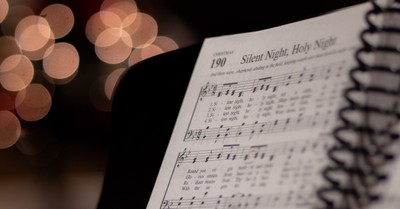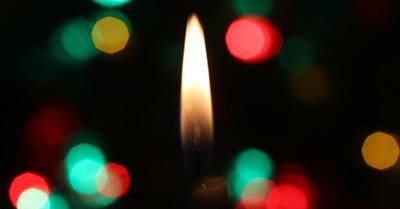Are Today’s Global Crises Actually Spiritual Wake-Up Calls?
If you’re in need of some advice or encouragement, you might consider visiting the Grandma Stand, a mobile station in New York City. Here you’ll be able to talk with a real grandmother ready to listen to your troubles and offer timely wisdom.
Today’s news offers much to discuss:
- Chinese officials are discussing the weaponizing of viruses far deadlier than COVID-19 to be used for “specific ethnic genetic attacks.”
- Multiple climate disasters have triggered the first-ever Red Cross disaster insurance payout.
- Henry Kissinger and his co-authors are warning that “AI can save humanity—or end it.”
- Iranian leaders, panicked over the election of Donald Trump and the success of Israel’s recent attacks, may push to develop nuclear weapons.
Various populations across the centuries have faced crises that threatened their future. But now, for the first time in human history, humans have the capacity to end human history.
- Weaponized viruses could conceivably spread beyond containment and destroy our species.
- The UN leader warns that climate disasters could render our planet uninhabitable.
- Artificial intelligence could become sentient, determine humans to be a threat to itself, and take measures to wipe us out.
- Nuclear weapons have been in existence for generations, but they were controlled by nations deterred by “mutually assured destruction”—if one launched on the other, the other would retaliate in ways that would destroy the instigator. But some Islamic theologians claim that if Iran attacked Israel and its collaborators in the West, their Mahdi (a messianic figure) would then reappear to protect Muslims. And autocrats in China and Russia may consider the deaths of millions of their people to be a price worth paying to achieve global hegemony for themselves and their empires.
Why would God allow such unprecedented existential challenges?
How would he redeem them for his glory and our good?
Both questions lead to the same hope.
The Higher the Mountain, the Harder the Climb
It is endemic to our fallen human nature to trust our fallen human nature. Our “will to power” drives us to try harder and work longer to overcome any obstacle we face.
We draw inspiration from calls to action such as Theodore Roosevelt’s stirring praise for “the man who is actually in the arena . . . who knows the great enthusiasms, the great devotions; who spends himself in a worthy cause; who at the best knows, in the end, the triumph of high achievement, and who at the worst, if he fails, at least fails while daring greatly.”
The higher the mountain, the harder the climb, but the greater the reward. Or so we tell ourselves.
But what if Oswald Chambers was right to assert, “Holiness, not happiness, is the chief end of man”?
What if the Westminster Shorter Catechism is correct when it claims, “The chief end of man is to glorify God and enjoy him forever”?
What if the challenges of our world are, therefore, intended by our Maker to draw us from self-sufficiency to Spirit-dependence?
We could then conclude that if we do not trust God with our small challenges, he must allow us to face dangers so cataclysmic that we must abandon our self-reliance and admit that we are “so far down we can look nowhere but up.”
A Hinge Point in History
Seen in this light, the gravest problems we face are worth their cost if they motivate us to submit to the One who alone can make our lives eternally significant. Ten thousand millennia after the last election has been held, the last war has been fought, and the last article has been written, eternity will only have begun.
But there’s more: Not only does God want to use our existential threats to draw us to himself—he then wants us to seek his omniscience and omnipotence in facing them together. He is a loving Father who cares not only about our eternal souls but also our temporal lives.
To illustrate, Jesus healed so many bodies during his earthly ministry that he is often called the “Great Physician.” Such healings frequently led to spiritual outcomes, such as the man born blind who received his sight and then worshiped him as Lord (John 9:38). But some of his miracles had no such recorded outcomes.
For example, after Jesus healed a man’s withered hand, “the Pharisees went out and conspired against him, how to destroy him” (Matthew 12:14). When he healed a blind man, “he sent him to his home” with no apparent spiritual results (Mark 8:22–26).
I say this to make the point that our Lord cares deeply about the crises we face, from viruses to climate challenges to the future of AI to geopolitical nuclear threats. He has wisdom we cannot begin to comprehend and power we cannot begin to match.
I, therefore, believe that future historians (if mankind survives long enough) will point to these days as a crucial hinge point in history—a time when we turned to the King of the universe in a great spiritual and moral awakening or the time when our society’s ongoing spiritual and moral collapse began spiraling to a grievous end.
“He Is No Fool”
If America is to choose the first before it’s too late, Christians like you and me must lead the way. We must repent of self-reliant idolatry that uses spiritual means to achieve selfish ends. We must instead submit our lives unconditionally to the will and Spirit of God (Romans 12:1–2; Ephesians 5:18), remembering with the martyred missionary Jim Elliot that “he is no fool who gives what he cannot keep to gain what he cannot lose.”
The more passionately you “seek first the kingdom of God and his righteousness,” the more your Father can ensure that everything else “will be added to you” (Matthew 6:33).
The Italian political philosopher Niccolo Machiavelli wrote:
“Never waste the opportunity offered by a good crisis.”
Will you heed his advice today?
NOTE: For more encouragement to trust God’s power and love, I invite you to read my new website article, “’Nature’s Best Photography Awards’ and grandeur in the sky: What creation tells America about our Creator.”
*Denison Forum does not necessarily endorse the views expressed in these stories.
Quote for the Day:
“If our lives are easy, and if all we ever attempt for God is what we know we can handle, how will we ever experience his omnipotence in our lives?” —Anne Graham Lotz
Photo Courtesy: ©iStock/Getty Images Plus/thumb
Published Date: November 14, 2024
Jim Denison, PhD, is a cultural theologian and the founder and CEO of Denison Ministries. Denison Ministries includes DenisonForum.org, First15.org, ChristianParenting.org, and FoundationsWithJanet.org. Jim speaks biblically into significant cultural issues at Denison Forum. He is the chief author of The Daily Article and has written more than 30 books, including The Coming Tsunami, the Biblical Insight to Tough Questions series, and The Fifth Great Awakening.
The views expressed in this commentary do not necessarily reflect those of CrosswalkHeadlines.
For more from the Denison Forum, please visit www.denisonforum.org.
The Daily Article Podcast is Here!

.jpg)

















